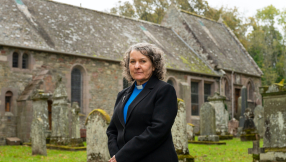Science on one side, religion on the other: it's been the same for centuries, with noble and virtuous scientists battling the dark forces of superstition and obscurantism.
Only it hasn't, really. Historians know perfectly well that this 'battle' was really a 19th-century invention with no grounding in fact at all. It came from the work of two American authors, John William Draper and Andrew Dickson White. Draper – born and educated in England – wrote a fiercely anti-Catholic book, The History of the Conflict Between Science and Religion. It purported to show how religion had always sought to suppress and denigrate science and it was wildly popular, going through 50 printings in the US alone. It was translated into 10 languages.
White's book A History of the Warfare of Science with Theology in Christendom was published in 1896 and claims to document the attempts by science to free itself from the shackles of religious dogma.
Ever since then, people have assumed science and religion conflict, and that we have to choose between them. But a just-released survey showing that actually, large numbers of scientists are either believers or are open to the possibility of belief, gives the lie to that. Yes, you can be a believer – a Christian, even – and still be a scientist. As Prof Eric Priest says, 'many scientists have a more subtle, nuanced view of the relationship and recognise that questioning, imagination, creativity, reason, faith and community are common features of both science and religion'.
So what causes the perception that there is a conflict, especially when so many great scientists, past and present, were and are believers?
As with so many conflicts, it's about territory. The late eminent biologist Stephen Jay Gould argued science and religion occupied different spheres, 'non-overlapping magisteria' (NOMA). They're good at particular things – science deals with how the physical world works, while religion deals with how people work – and how they ought to work. If religion starts making statements about areas that are properly the preserve of scientists – like saying the sun goes round the earth – scientists can rightly complain. If science starts claiming human beings should be bred for excellence and undesirables should be sterilised, like eugenicists Francis Galton and Marie Stopes, religious people will oppose them adamantly.
NOMA doesn't quite work, in that religion and science will sometimes overlap. If a religious person says God intervenes to heal people through prayer, for instance, that is in theory a testable statement. What fuels the 'conflict' theory, though, is when either side claims too much. When young-earth creationists, for instance, say the earth is only 6,000 years old and that there were dinosaurs on the ark, they are stomping on scientists' territory in hobnailed boots and breathing new life into an argument that should have been put to bed years ago.
The relationship between science and religion is far more complicated than the traditional adversial portrayal, not least because like science, religion is a quest for knowledge; and like religion, science involves human imagination, creativity and striving. We shouldn't be surprised that so many scientists are open to religion. If we could finally bust the myth that the two are in conflict, it might mean a few more of them are – and it might make religious people more open to the wonders of science, too. Because science isn't a threat – it is a gift, enabling us to read the book of God's works as we read the book of his Word.
Follow Mark Woods on Twitter: @RevMarkWoods













